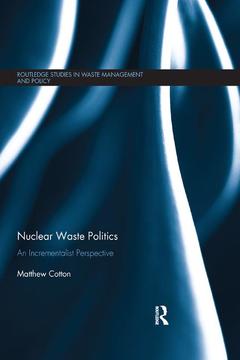Description
Nuclear Waste Politics
An Incrementalist Perspective
Routledge Studies in Waste Management and Policy Series
Author: Cotton Matthew
Language: English
Subjects for Nuclear Waste Politics:
Keywords
RWM; Site Selection; Canada; Deep Geological Disposal; Climate Change; Radioactive Waste Management Options; Conservation; Spent Nuclear Fuel; Environment and Planning A; Geological Disposal; Environmental Values; Nuclear Industry Radioactive Waste Executive; Environmental economics; GDF; Environmental policy; Radioactive Waste Management Facilities; Environmental studies; Intermediate Level Radioactive Waste; Journal of Environmental Planning and Management; High Voltage Overhead Transmission Lines; Nuclear Technologies; Higher Activity Wastes; Nuclear Waste Management and Legitimacy; Public Engagement; Nuclear Waste Management in a Globalised World; Cumbria County Council; Public Understanding of Science; Intermediate Level Wastes; West Cumbria; Radioactive Waste; UK Nuclear Industry; Sustainability; Options Assessment Process; Sustainable development; Long Term Radioactive Waste Management; Technocracy; RWM Policy; The Bedrock of Opinion; Radioactive Waste Management Problem; The International Politics of Nuclear Waste; RWMAC; The National Politics of Nuclear Power; Inflexible Technologies; The Politics of Radioactive Waste Disposal; LLW Repository; Too Hot to Touch; UK’s Exit; USA; environment and society; environmental ethics; environmental geography; environmental impact assessment; nuclear Waste legitimacy; nuclear politics; participatory governance; radioactive Waste legitimacy; radioactive waste management; risk assessment; risk management; strategic environmental assessment; technology policy
Approximative price 53.83 €
In Print (Delivery period: 14 days).
Add to cartPublication date: 12-2018
· 15.6x23.4 cm · Paperback
Approximative price 160.25 €
In Print (Delivery period: 14 days).
Add to cartPublication date: 06-2017
· 15.6x23.4 cm · Hardback
Description
/li>Contents
/li>Readership
/li>Biography
/li>
The question of what to do with radioactive waste has dogged political administrations of nuclear-powered electricity-producing nations since the inception of the technology in the 1950s. As the issue rises to the forefront of current energy and environmental policy debates, a critical policy analysis of radioactive waste management in the UK provides important insights for the future.
Nuclear Waste Politics sets out a detailed historical and social scientific analysis of radioactive waste management and disposal in the UK from the 1950s up to the present day; drawing international comparisons with Sweden, Finland, Canada and the US. A theoretical framework is presented for analysing nuclear politics: blending literatures on technology policy, environmental ethics and the geography and politics of scale. The book proffers a new theory of "ethical incrementalism" and practical policy suggestions to facilitate a fair and efficient siting process for radioactive waste management facilities. The book argues that a move away from centralised, high capital investment national siting towards a regional approach using deep borehole disposal, could resolve many of the problems that the high stakes, inflexible "megaproject" approach has caused across the world.
This book is an important resource for academics and researchers in the areas of environmental management, energy policy, and science and technology studies.
Chapter 1 – The problem of radioactive wastes
Chapter 2 – Inflexible technologies and incrementalism
Chapter 3 –Nuclear power and the problem of radioactive waste
Chapter 4 - Nirex and the search for a site
Chapter 5 – Health, environmental risks and the social construction of radioactive waste
Chapter 6 - The participatory-deliberative turn
Chapter 7 - Managing Radioactive Waste Safely
Chapter 8 – Partnership, volunteerism and ethical incrementalism
Chapter 9 – What next for nuclear waste?
Matthew Cotton is a Lecturer in Environmental Policy and Planning at the University of Sheffield, UK
These books may interest you

Management of Radioactive Waste 171.59 €



